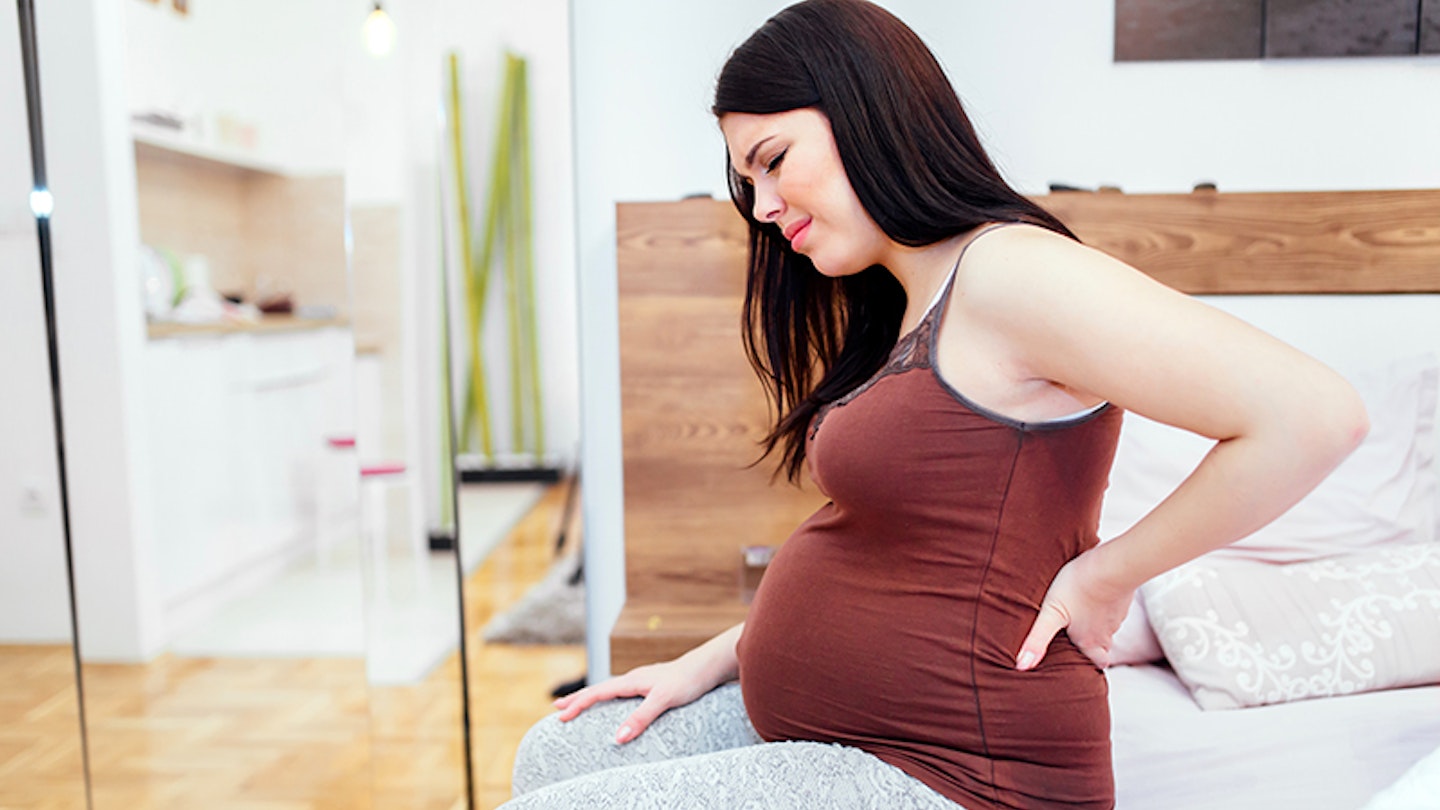Back pain in pregnancy is common due to all the changes happening in your body and affects an estimated 50 to 80 per cent of pregnant women. But while back pain related to pregnancy is often associated with the later stages of pregnancy when you're carrying around a huge bump, not to mention your baby growing inside it, back pain is actually a common symptom of pregnancy very early on too. We find out from experts what causes back pain in pregnancy and how to help soothe it, no matter what stage you're at.
How to relieve back pain in pregnancy
The NHS says that the ligaments in your body naturally become softer during pregnancy, stretching to eventually prepare you for labour. They say that this can put a strain on the joints of your lower back and pelvis, and this is what can cause back in pregnancy.
While it's completely normal to experience back pain throughout pregnancy, here are some of the things you can do to help keep your back healthy, and reduce and soothe your pain and discomfort while little one continues to grow.
1. Stay active
Pregnant or not, gentle exercise can go a long way to keeping your body — and spine — strong.
"Regular walking and swimming will keep your muscles in good shape and your joints flexible, which supports your back," says Pregnancy and Postnatal Fitness Expert Dr. Joanna Helcké.
"Essentially, your joints are supported by ligaments and muscles — so, the stronger they are, the less your back will hurt", she says.
Mum, Beth Green, struggled with back pain during her pregnancy. She shares, "I found swimming was a great way to exercise, as it relieved the pain whilst helping me to stay active."
Strengthening your core muscles during pregnancy is good practice and helps prepare you for postnatal recovery. Pilates-style exercises are fantastic for this area fo your body, but you should seek advice from your GP or midwife before beginning an exercise routine, especially if you didn't exercise much before you were pregnant.
"A safe way to start is to sit on an exercise ball to eat your meals or while you watch TV," says Joanna, explaining that; "Your core muscles have to engage to keep you stable."
Pregnancy yoga classes are also a good way to strengthen your back and beat those aches and pains, they'll also help you to relax, and they're a great opportunity to make new friends with mums-to-be in your local area.
See our guide on how to exercise during pregnancy.
2. Sleep comfortably
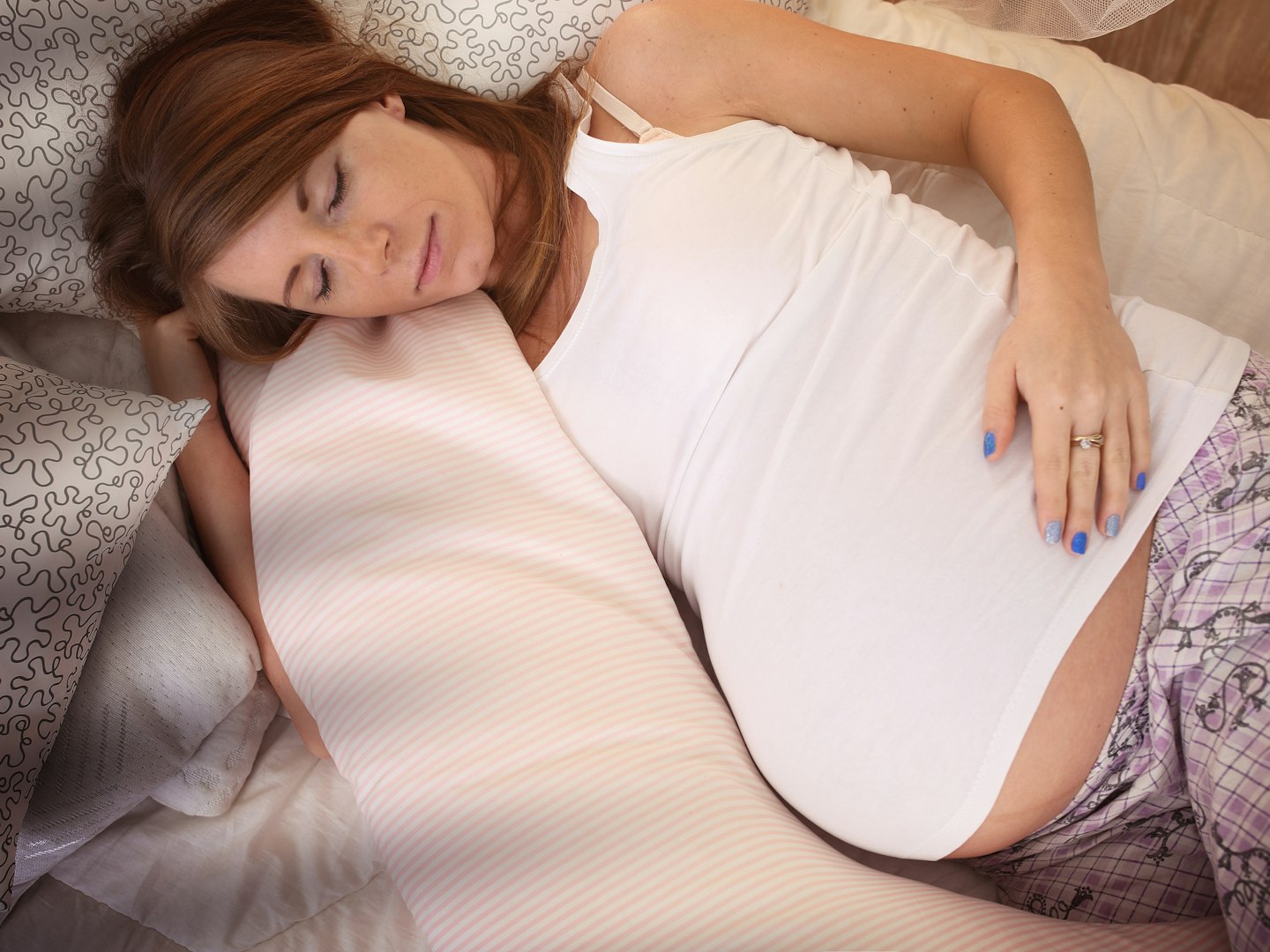
The NHS acknowledges that it's common to feel tired, and even exhausted, during pregnancy, especially in the first 12 weeks. They say; "Hormonal changes at this time can make you feel tired, nauseous and emotional. The only answer is to rest as much as possible."
Of course, making sure you get enough sleep isn't necessarily straightforward, especially if you're struggling with things like back pain, making sleep uncomfortable.
While pregnant, try to sleep on your side, supported by pillows to take pressure off your bump and give your back a well-deserved break from the extra weight. "If backache is interrupting your sleep, tuck a cushion under your knees while you’re on your back," says Joanna. "This tilts your pelvis and gives your spine relief."
Pregnancy pillows are great for helping support your body in the bed as your bump develops, so that you can fihnd a comofrtable position to sleep in. When it comes to learning how to use a pregnancy pillow effectively, it'll depend on what kind you have. Sleeping on a firm matress will also help keep your back happy.
3. Fix your posture
"Pregnancy is often the last straw for backs that have put up with years of bad posture and habits," says Physiotherapist Sammy Margo.
"Back posture is fundamental to general health and wellbeing," adds Sammy. "Your alignment affects your organs, breathing, muscles, digestion and fatigue. The effects of poor posture are amplified by pregnancy as ligaments become stretched — and the pain can continue after birth."
Here's a few good tisp to help you establish good posture:
-
When you’re walking, stop to link your hands behind your back to open your shoulders and get a sense of where your spine should be.
-
When sitting, remember BBC - Bum on Back of Chair (i.e. sit on the bottom of your jean pockets, not the top).
4. Wear flat shoes
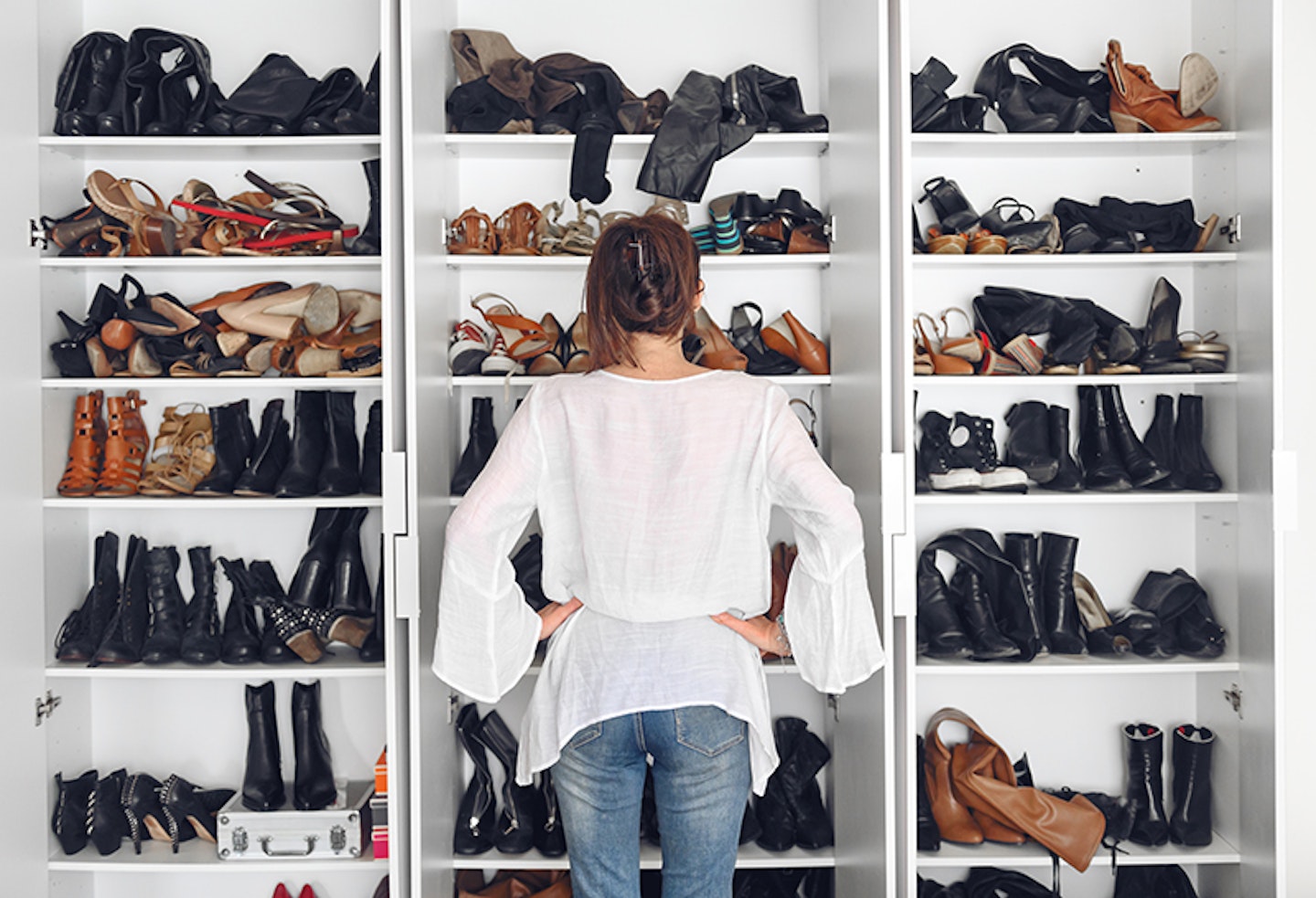
You may long for fabulous footwear, but sticking to heels no higher than one and a half inches will help you keep your posture when pregnancy has thrown you off balance and your centre of gravity shifts.
It's also a good idea to invest in insoles with good arch support - you won't believe how much it will help your back!
5. Feel-good foods (and vitamins)

Omega-3 fatty acids found in fish, such as salmon, could help relieve back pain by calming inflammation in your blood vessels and nerves. Remember to eat the oily fish no more than twice a week though.
You could also take Omega-3 supplements (not cod liver oil), along with your prenatal vitamins and supplements, to keep levels topped up and keep back aches in check.
6. Bend at the knees
Bending at the knees to pick things up, rather than curling your whole body forward, means you bear weight in your legs, not your spine. This is important to do whether you're pregnant or no, but moreso when you're pregnant and you start to carry more weight in front.
"To check you are doing this right, stand in front of a chair and bend as though you’re going to sit," says Joanna, "As your bottom is about to hit the chair, your back should be neutral, with your heels on the floor and your knees bent."
Think - squat down and lift, rather than putting more strain on your back. You should try to avoid lifting if possible, and ask your partner or children to help. Alternatively try to do things standing up or sitting down as much as possible when doing chores. For example, fold the laundry on your kitchen counter or table, or while sitting on the sofa.
7. Soothe pains
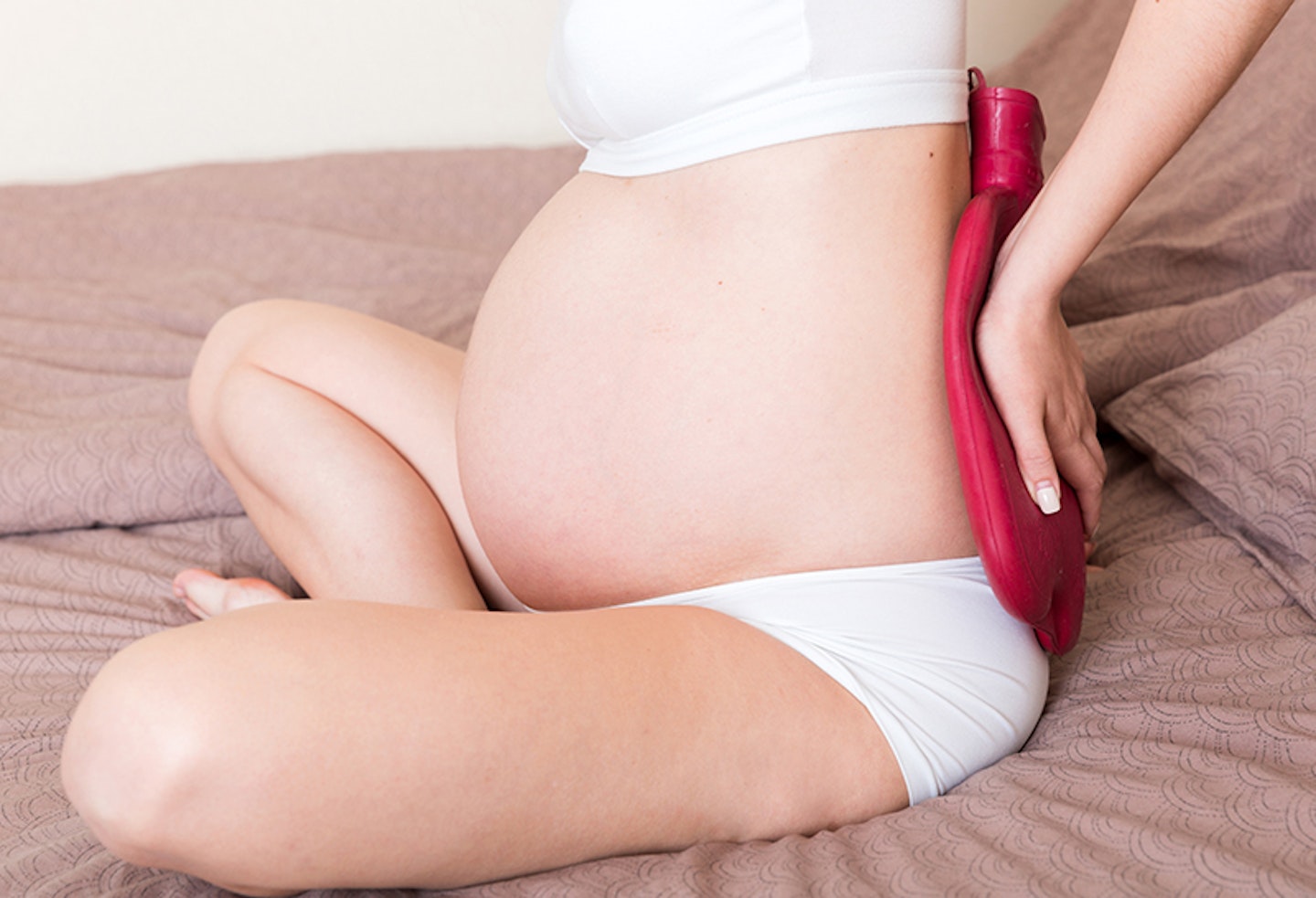
Avoid anti-inflammatory painkiller gels with diclofenac, such as Voltarol Emulgel. While they are good for back pain generally due to blocking the chemicals that cause inflammation, stiffness and tenderness, they're not advised for use while pregnant, particularly if in your third trimester.
Instead opt for natural ways to soothe pain. Studies say acupuncture can be more effective than drugs, while a covered hot-water bottle can help relax tight muscles and boost circulation to ease inflammation.
You can take paracetamol when pregnant to ease back pain, unless your GP or midwife says not to. Always follow the instructions on the packet.
8. Mix up your movements
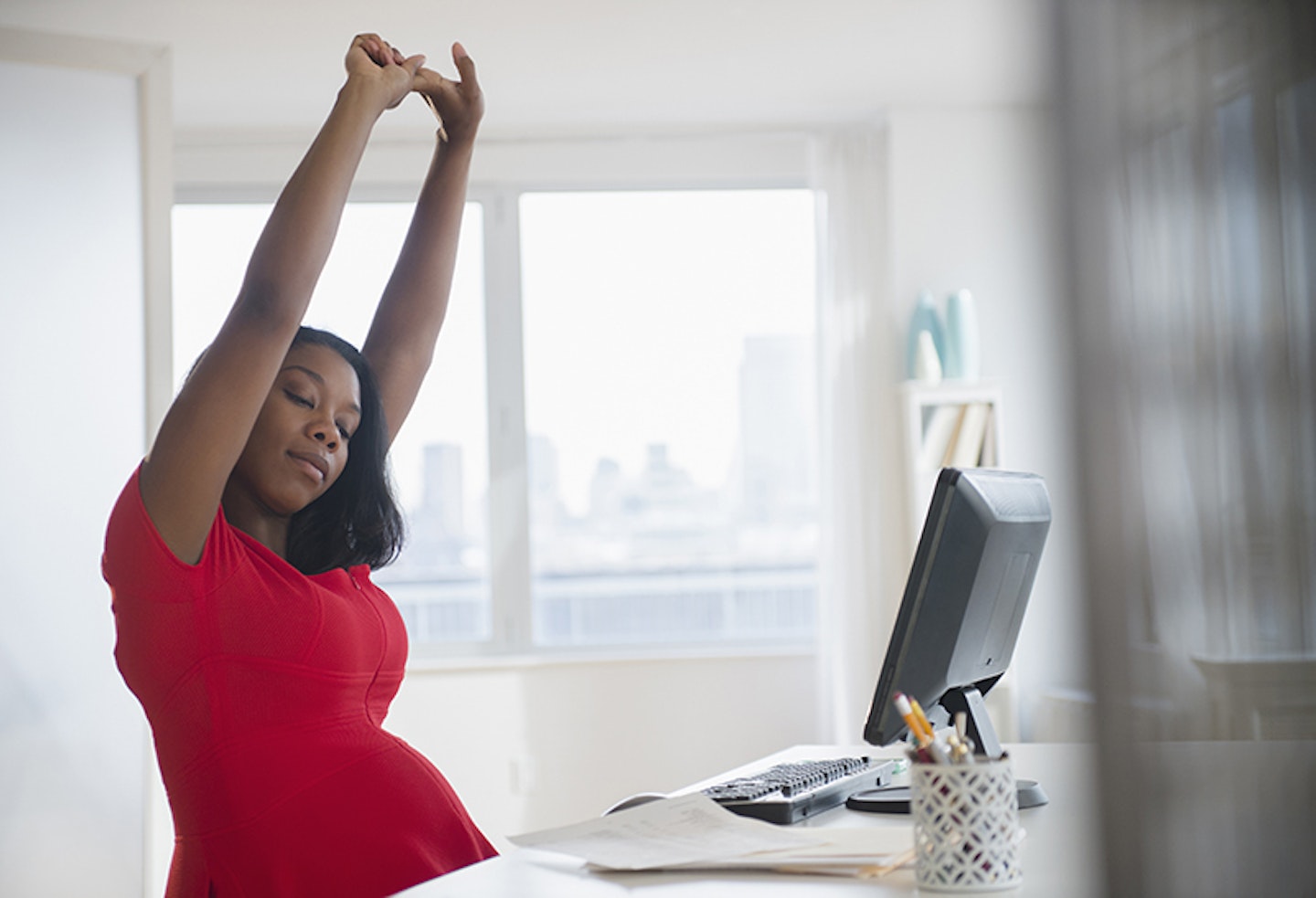
Repetitive movements can trigger pain, so if you're working from home and sitting at a desk all day, try to mix things up by taking regular short breaks. Evan a circuit of the room while stretching your arms behind your back, can make a difference.
If you're already a mum, feeding, changing nappies and lifting your baby involve a series of repetitive movements. The best way to avoid this, while it may feel unnatural, is to try to alternate the side on which you hold your baby.
FAQ: Back pain in pregnancy
When does back pain start in pregnancy?
Studies show that lower back pain usually occurs between the fifth and seventh months of being pregnant, although in some cases it begins as early as eight to 12 weeks.
Is lower back pain normal in early pregnancy?
Yes. This pain in your lower spine or even your pelvis (pelvic girdle pain) is caused by a pregnancy hormone called relaxin, which makes your ligaments and joints relax and become looser, so your body is ready to give birth. In fact 50–80% of women [experience back pain during pregnancy.]{href='http://www.ncbi.nlm.nih.gov/pmc/articles/PMC2684210/' target='_blank' rel='noreferrer noopener'}
According to the NHS, 'during pregnancy, the ligaments in your body naturally become softer and stretch to prepare you for labour. This can put a strain on the joints of your lower back and pelvis, which can cause back pain.'
Pregnancy hormones temporarily loosen your ligaments, making your back vulnerable. Add in the effect a bump has on your posture and the pressure of a baby on your spinal nerves, and it’s easy to see why back problems are so prevalent in mums.
What being pregnant does to your spine
The same hormone that prepares your pelvis for childbirth can cause ligaments that support the spine to loosen, leading to instability and pain. As baby grows, because of the weight gain, as well as the change in your center of gravity (as you're holding more weight in front of you), your spine is susceptible to aches, pains and injuries from being extended in new, different ways.
Your spine can also become rotated during your pregnancy, particularly if you suffered from back pain before you were pregnant, which can lead to slipped discs and sciatica if left untreated.
You may find that wearing a maternity support belt or belly band helps alleviate your back pain, but there are lots of other ways to soothe back aches too.
How does scoliosis affect pregnancy?
Most pregnant women with sideways curvature of the spine, or scoliosis, will find that their condition doesn't affect their pregnancy at all.
However, women with severe curvature of the spine, or those whose scoliosis involves the hips, pelvis or shoulders, may experience more pain and discomfort, breathing problems or weight-bearing difficulties — especially later in the pregnancy.
Back pain in pregnancy — third trimester
If you're experiencing back pain in your third trimester, let your midwife or GP know, as it could be a sign of early labour.
When should I worry about back pain in pregnancy?
You should seek medical advice if your backache is very painful, if you have pain in your back and you experience any loss of sensation in your legs or bum, or you have pain in your sides (like a stitch).
How to relieve severe back pain during pregnancy?
If your back pain is severe you should consult with your doctor, as it could be a pregnancy complication or other serious medical concern.
About the experts
Dr Joanna Helcké Dr Joanna Helcké wears many hats in life. She is the mother of her boys, as well as a Pregnancy & Postnatal Fitness Expert, Award Winner, Public Speaker, Raw Vegan Chef & passionate lover of coffee & chocolate!
Sammy Margo is the Director of Physiotherapy Services, and established her clinic more than 25 years ago. She qualified in London as a physio and subsequently completed a Master's in Physiotherapy at University College and The Middlesex Hospital. She is also a qualified Aerobics and Pilates instructor and incorporates this 'balanced body' approach into her physiotherapy treatments. She is a a member of the Manipulative Association of Chartered Physiotherapists (MACP).
Proud aunt to her teen niece, Zara Mohammed is a Digital Writer for Mother&Baby. She has 10 years freelance writing experience creating lifestyle content for various platforms, including pregnancy, women’s health, parenting, child development and child mental health, plus lots of fun seasonal family articles and celebrity news.
